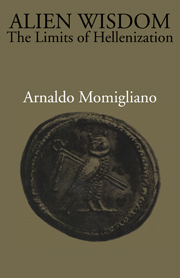Book contents
- Frontmatter
- Contents
- Per mia madre, presente sempre nel suo vigilc amore
- Preface
- 1 The Greeks and their neighbours in the Hellenistic world
- 2 Polybius and Posidonius
- 3 The Celts and the Greeks
- 4 The Hellenistic discovery of Judaism
- 5 Greeks, Jews and Romans from Antiochus III to Pompey
- 6 Iranians and Greeks
- Select Bibliography
- Index of Names
2 - Polybius and Posidonius
Published online by Cambridge University Press: 01 June 2011
- Frontmatter
- Contents
- Per mia madre, presente sempre nel suo vigilc amore
- Preface
- 1 The Greeks and their neighbours in the Hellenistic world
- 2 Polybius and Posidonius
- 3 The Celts and the Greeks
- 4 The Hellenistic discovery of Judaism
- 5 Greeks, Jews and Romans from Antiochus III to Pompey
- 6 Iranians and Greeks
- Select Bibliography
- Index of Names
Summary
How many tear-drops are implied in the simple Greek word ὲδάκρυεν, ‘he wept’? Classical scholars can be trusted to ask such questions. The occasion is famous, the protagonists are distinguished; Scipio Aemilianus crying over burning Carthage, Polybius suitably present and ready to elicit the right answer: ‘turning round to me at once and grasping my hand, Scipio said: “A glorious moment, Polybius, but I have a dread foreboding that some day the same doom will be pronounced upon my own country”’ (38.21.1, transl. W. R. Paton). The mutilated text of the passage of Polybius has come down to us in the Excerpta de sententiis and the keyword ὲδάκρυεν, ‘he wept’, has to be supplied from Diodorus (32.24) with the support of Appian, Punica 132: they are known to have used Polybius directly or indirectly. The supplement seems to be right. Scipio did cry, and classical scholars are therefore entitled to ask how many tears he shed. As Professor A. E. Astin observes in his very valuable book on Scipio Aemilianus (1967): ‘By ὲδάκρυεν Diodorus (Polybius) need not necessarily mean that Scipio shed a flood of tears, that he truly wept. It is also possible to envisage moist eyes, with a tear or two trickling down either cheek; and this would be much more consistent with Polybius’ praise of Scipio's attitude, that of “a great, a perfect man, a man in short worthy to be remembered”’ (p. 285).
- Type
- Chapter
- Information
- Alien WisdomThe Limits of Hellenization, pp. 22 - 49Publisher: Cambridge University PressPrint publication year: 1975



